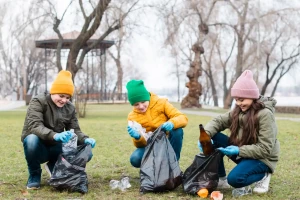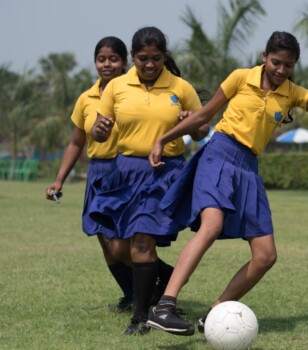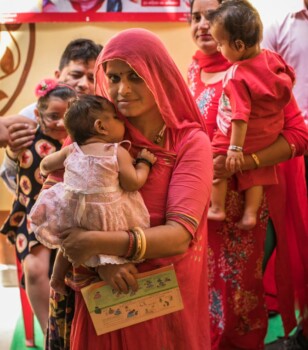Implemented By: Rotary Club of Calcutta Pointers About the Project: The SAPLING project was initiated to promote organic farming practices and sustainable livelihoods in the rural belt of South 24 Parganas, West Bengal. The initiative primarily supports A Village for Independent and Enterprising Women (A VIEW)—a nonprofit rehabilitation center for mentally ill homeless women—as well
Protecting the
Environment
Rotary is committed to protecting the world’s shared legacy: the environment. Rotary members actively fight climate change and environmental degradation by conserving and protecting natural resources, advancing ecological sustainability, and fostering harmony between communities and the environment. In 2021-22, $1.7 million was released to support efforts such as providing quality equipment to increase plastic recycling programs and solar panels to power pumphouses.
Rotary supports activities that strengthen the conservation and protection of natural resources advance environmental sustainability, and foster harmony between people and the environment.
Key Interventions
Protecting and restoring land, coastal, marine, and freshwater resources.
- Protecting and restoring terrestrial ecosystems.
- Preserving biodiversity by protecting and restoring habitats, conserving native species, and removing invasive plant and animal species.
- Supporting strategies and targeted initiatives to improve aquifer and groundwater recharge, water conservation, water quality, sanitation, and watershed management.
- Protecting and restoring coastal, marine, and freshwater ecosystems through initiatives such as habitat restoration and protecting and propagating native plant and animal species.
Enhancing the capacities of communities and local governments for natural resource management and conservation.
- Developing peacebuilding and conflict prevention initiatives for managing and using natural resources.
- Mitigating human-wildlife conflict through ecologically sound and peaceful resolutions
- Training and educating communities in conservation and resource management
Supporting agroecology and sustainable agriculture, fishing, and aquaculture practices
- Creating awareness of and supporting ecologically viable agriculture
- Supporting sustainable fisheries and ecologically sound aquaculture (adhering to the policy statements and guidelines for the community economic development area of focus)
- Promoting the use of traditional and Indigenous knowledge in agricultural, land, ocean, and natural resource management practices
- Improving food security through sustainable agricultural, aquacultural, and fishing methods, enhanced local food production and consumption
Addressing the causes of climate change and climate disruption and supporting solutions to reduce the emission of greenhouse gases
- Providing access to locally sourced, renewable energy, including solar, methane-capture, and small-scale wind and hydropower systems, as part of holistic interventions to mitigate climate change and disruption
- Clean cooking technologies should be provided as part of a holistic approach to reduce or eliminate the burning of biomass and fossil fuels
- Providing clean-cooking technologies as part of a holistic approach to reduce or eliminate the burning of biomass and fossil fuels
- Supporting the transition to sustainable, energy-efficient transportation modes
Strengthening the resilience of ecosystems and communities affected by climate change and climate disruption.
- Supporting adaptation and resiliency strategies for ecosystems and communities affected by climate-related events
Supporting education to promote behaviors that protect the environment.
- Supporting environmental education programming in schools that align with local government
- Promoting community-based environmental education, environmental awareness, and advocacy initiatives
Advocating for the sustainability of products and the environmentally sound management of byproducts
- Supporting community planning efforts to strengthen circular economies through composting, recycling, upcycling, and repurposing programs
- Promoting efficient food consumption by reducing food waste by local businesses and households
Addressing environmental justice and environmental public health concerns
- Addressing adverse environmental public health impacts in communities through education, outreach, and advocacy
- Eliminating and reducing exposure to environmental toxins in homes, schools, and communities
- Increasing equitable access to organic, healthy, and nutritious food for vulnerable and marginalized populations
Programmes
Implemented By: Rotary Club of Thane North About the Project: This project was conceptualized to address the dual challenges of water scarcity and limited livelihood opportunities in the tribal farming communities of Jawhar, located in the Palghar district of Maharashtra. Despite receiving over 3000 mm of annual rainfall, the region suffers from seasonal water shortages
Implemented by: Rotary Club of India Location: Sundarbans This project aims to preserve the mangroves in the Sundarbans, India, by providing alternative livelihoods to reduce anthropogenic pressure. It includes embankment shoring using coconut palms and Nypa fruiticans, establishing apiaries for 150 families, and managing plastic pollution through shredding and recycling. These initiatives will economically empower
Stories From The Field
Dec 16, 2023 In India, authorities need to restore most of the forests. Both, forest conservation and land restoration require a combination of philanthropy and government support, believes an ecologist who just returned from the two-week-long UN Climate Change conference, or the Conference of the Parties of the UNFCCC (COP28) in Dubai. India faces unique
Dr. Meenakshi VenkataramanJune 5, 2023 The Earth has endured scorching heat for 46 years now. Environmental shocks due to global warming continue to impact nature and humanity in unprecedented ways establishing climate change as a ‘defining issue’ of our time. To set the context, the oceans were the hottest ever last year, and carbon dioxide
Atul Bhide Dec 28, 2021 I am an entrepreneur and a ‘Rotarian’ since 2000. To begin with, when I was invited to join Rotary (an international service organisation), my first immediate intention was to build new connections and friends. But with time, I became more engrossed in meeting community needs and gradually started myself involving










